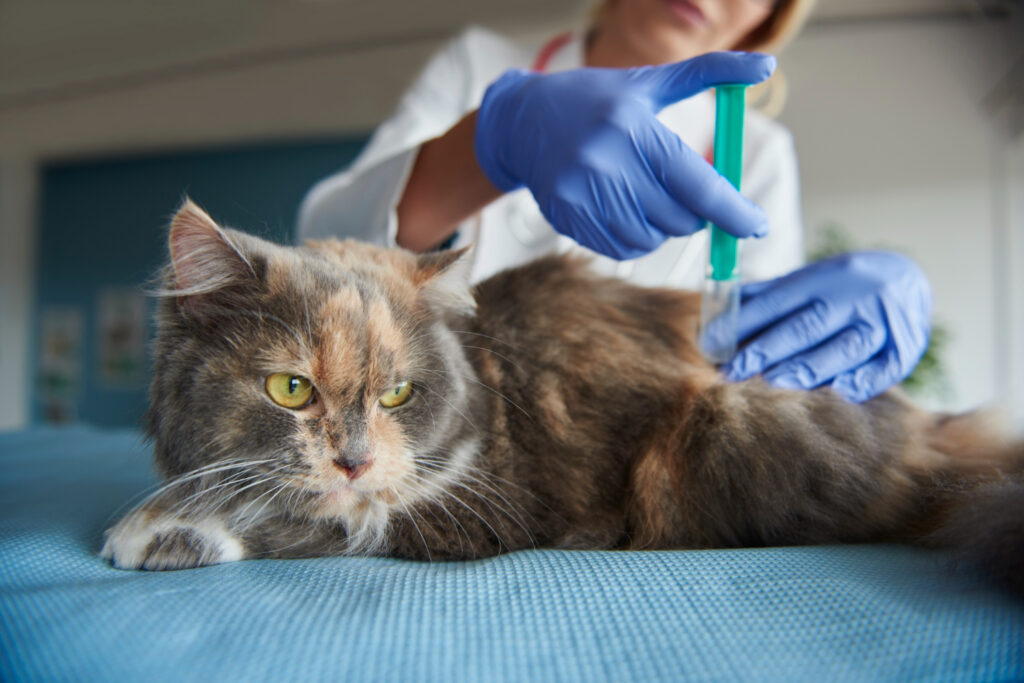It should go without saying that frequent checks are essential for the health of all cats. On the other hand, some people are unsure about how frequently they ought to take their cat to the vet. Many people believe that cats don’t need as much veterinary care as dogs do. They believe that cats can care for themselves and do not require you to bring them in for a checkup unless they are showing overt symptoms of illness. Actually, you should visit the vet for your cat a lot more regularly than that.
Baby Kittens
Baby kittens are undoubtedly the epitome of cuteness overload. Those tiny paws and innocent eyes can melt even the hardest of hearts! But amidst all the adorableness, it’s crucial to remember that these little bundles of joy require special care and attention. When it comes to taking baby kittens to the vet, timing is essential. Ideally, If your cat is four months old or less the vet may recommend monthly visits until they are about five months old.
This initial check-up helps identify any potential health issues or congenital conditions that may need immediate attention. During this visit, the veterinarian will conduct a thorough examination, checking for signs of illness or developmental abnormalities. They may also administer vaccinations and provide guidance on proper nutrition and hygiene practices for your growing kitten.
As baby kittens are more prone to infections and illnesses due to their developing immune systems, regular veterinary visits become critical during their early months. These appointments ensure that they receive timely vaccinations against common feline diseases like panleukopenia, calicivirus, rhinotracheitis, and feline leukemia.
Adult Cats
When it comes to adult cats, regular veterinary check-ups are essential for maintaining their overall health and well-being. While kittens require more frequent visits to the vet due to their rapidly developing bodies, adult cats should still be seen by a veterinarian at least once a year. During these annual check-ups, your cat will receive a thorough examination to assess their physical condition and address any potential health issues that may have arisen.
Keep Reading: https://dogpets.org/dog-adoption/what-is-dog-boarding/
The vet will also update your cat’s vaccinations if necessary and perform routine tests such as blood work or fecal analysis. It is important to note that even if your adult cat appears healthy, they can still benefit from regular veterinary care. Cats are masters at hiding signs of illness or discomfort, so an annual visit allows the vet to catch any underlying conditions early on before they become more serious.
In addition to annual check-ups, it’s crucial to monitor your cat’s behavior and look out for any changes in appetite, litter box habits, or energy levels. If you notice anything unusual or concerning about your adult cat’s health, don’t hesitate to schedule a visit with the vet.

Elderly Cats
Why is it necessary to take your elderly cat to the vet? Well, just like humans, aging brings about a host of potential health issues in cats. From arthritis and dental problems to kidney disease and hyperthyroidism, older cats are more prone to various ailments.
Cats are considered seniors around 7 years of age. For elderly cats, bi-annual or even quarterly vet visits might be recommended. These visits help in the early detection of age-related issues such as arthritis, kidney problems, and dental diseases. Regular screenings and blood tests can aid in catching and managing health problems in their early stages.
Regular veterinary visits can help catch any potential health issues early on before they become serious. Your vet can perform thorough examinations, run blood tests, and recommend appropriate treatments or medications if needed. Physical health concerns, elderly cats may also experience cognitive decline as they age. This includes changes in behavior such as disorientation or increased vocalization. A veterinarian can assess these symptoms and provide guidance on how best to support your senior cat’s mental well-being.
Preparing For Changes
Cats are sensitive to changes in their environment. Whether it’s moving to a new home, introducing a new pet, or a change in routine, consider the following:
- Gradual Introductions: Introduce changes slowly to help your cat adapt. For instance, if you’re bringing in a new pet, allow them to scent-swap and have controlled interactions.
- Safe Spaces: Ensure your cat has access to safe, quiet spaces where they can retreat if they’re feeling stressed.
- Consistency: Stick to a routine as much as possible. Cats find comfort in predictability.
- Pheromone Diffusers: Feliway diffusers release calming pheromones that can ease stress during changes.
Conclusion
Caring for cats is a rewarding journey that spans from kittenhood to old age. Regular veterinary care, tailored nutrition, and understanding their unique needs at each stage are the pillars of feline well-being. By providing love, attention, and a supportive environment, you’ll ensure your cat leads a happy and healthy life through all the changes it encounters.


